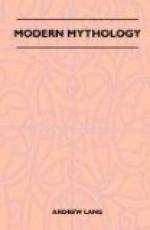Philological mythologists prefer to believe that the forgotten meaning of words produced the results; that the wolf-born Apollo ([Greek]) originally meant ‘Light-born Apollo,’ {82b} and that the wolf came in from a confusion between [Greek], ‘Light,’ and [Greek], a wolf. I make no doubt that philologists can explain Sminthian Apollo, the Dog-Apollo, and all the rest in the same way, and account for all the other peculiarities of place-names, myths, works of art, local badges, and so forth. We must then, I suppose, infer that these six traits of the mouse, already enumerated, tally with the traces which actual totemism would or might leave surviving behind it, or which propitiation of mice might leave behind it, by a chance coincidence, determined by forgotten meanings of words. The Greek analogy to totemistic facts would be explained, (1) either by asking for a definition of totemism, and not listening when it is given; or (2) by maintaining that savage totemism is also a result of a world-wide malady of language, which, in a hundred tongues, produced the same confusions of thought, and consequently the same practices and institutions. Nor do I for one moment doubt that the ingenuity of philologists could prove the name of every beast and plant, in every language under heaven, to be a name for the ‘inevitable dawn’ (Max Muller), or for the inevitable thunder, or storm, or lightning (Kuhn-Schwartz). But as names appear to yield storm, lightning, night, or dawn with equal ease and certainty, according as the scholar prefers dawn or storm, I confess that this demonstration would leave me sceptical. It lacks scientific exactitude.
Mr. Frazer on Animals in Greek Religion
In The Golden Bough (ii. 37) Mr. Frazer, whose superior knowledge and acuteness I am pleased to confess, has a theory different from that which I (following McLennan) propounded before The Golden Bough appeared. Greece had a bull-shaped Dionysus. {83a} ’There is left no room to doubt that in rending and devouring a live bull at his festival, his worshippers believed that they were killing the god, eating his flesh, and drinking his blood.’ {83b} Mr. Frazer concludes that there are two possible explanations of Dionysus in his bull aspect. (1) This was an expression of his character as a deity of vegetation, ’especially as the bull is a common embodiment of the corn-spirit in Northern Europe.’ {84a} (2) The other possible explanation ’appears to be the view taken by Mr. Lang, who suggests that the bull-formed Dionysus “had either been developed out of, or had succeeded to, the worship of a bull-totem."’ {84b}




